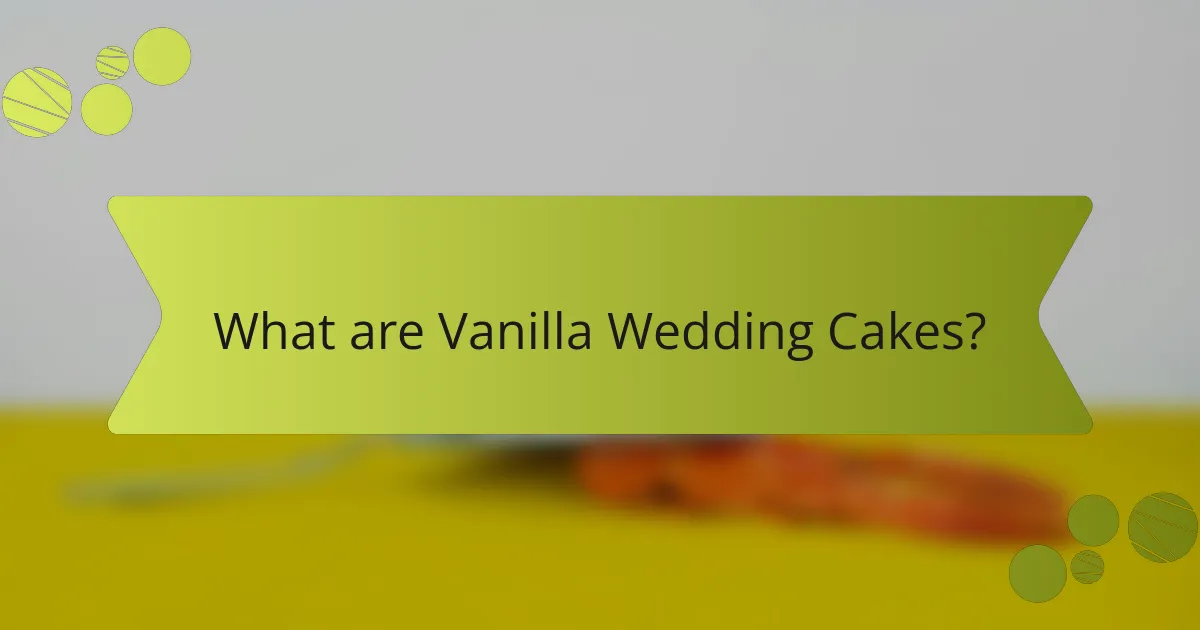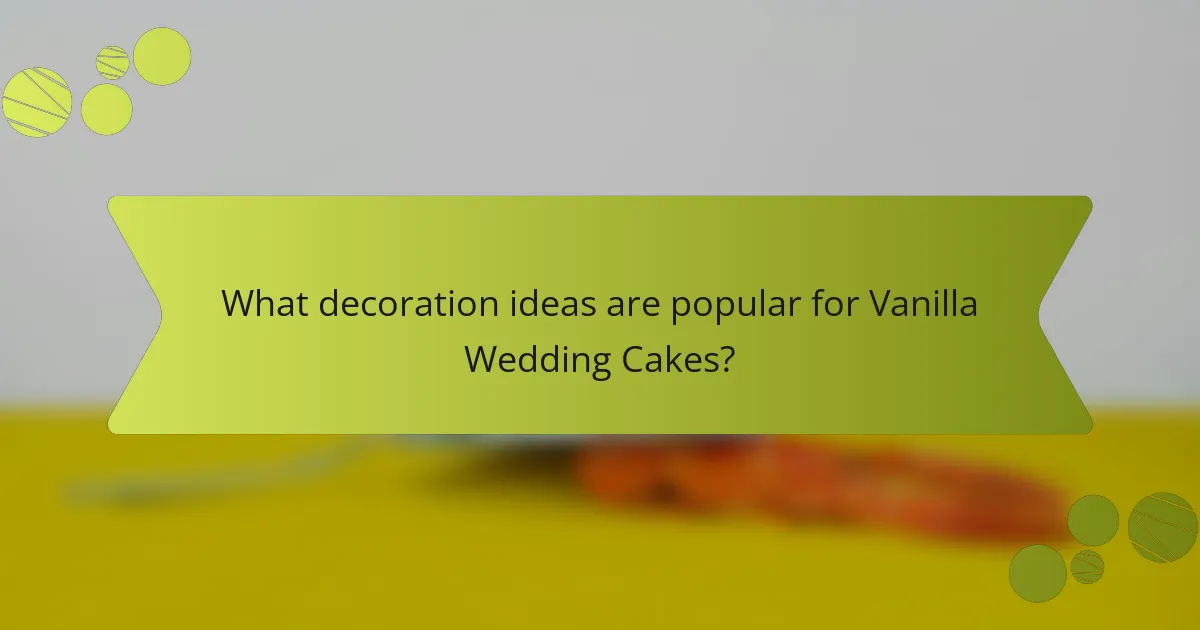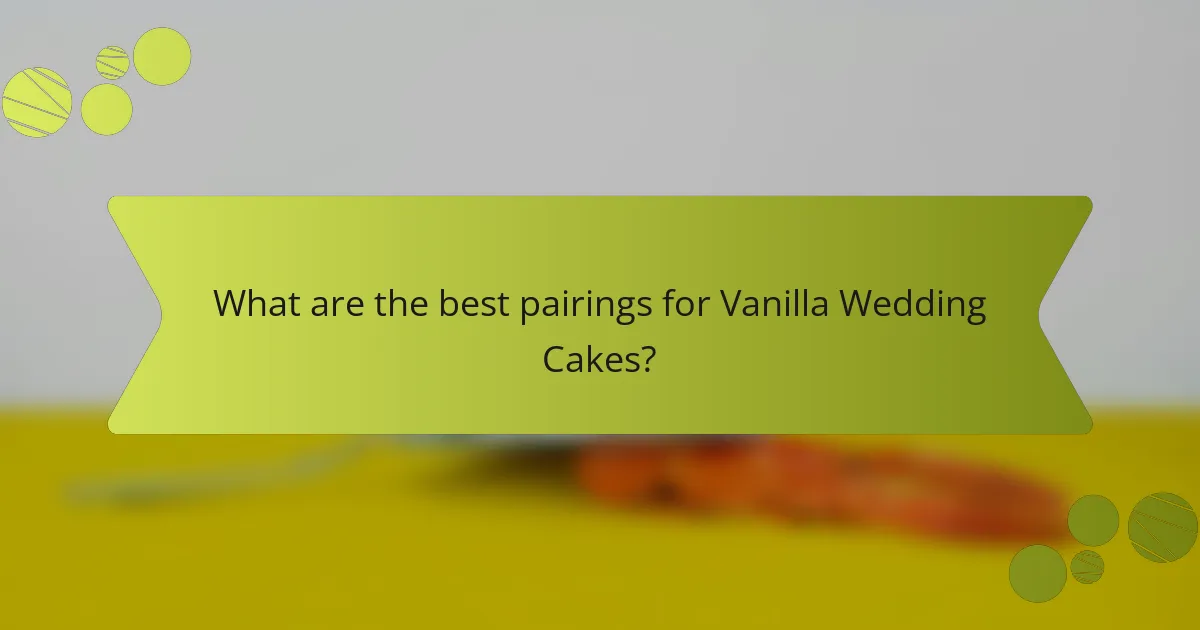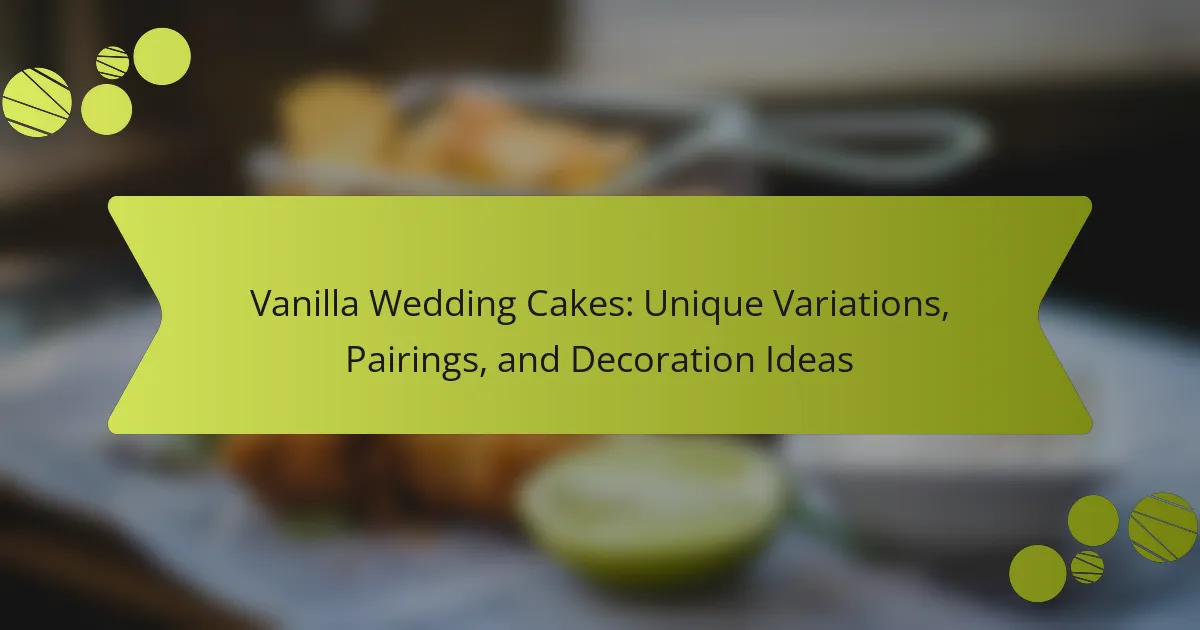Vanilla wedding cakes are traditional desserts served at wedding receptions, known for their distinct vanilla flavor derived from vanilla extract or beans. These cakes are typically layered and can be adorned with a variety of frostings, fresh flowers, fruits, and elegant piping techniques. Their versatility allows them to pair well with numerous fillings and flavors, making them a popular choice among couples. The article explores popular decoration ideas, such as seasonal fruits and sugar flowers, as well as ideal flavor pairings, including chocolate, floral notes, and citrus elements, to enhance the overall cake experience. Historical context highlights the enduring popularity of vanilla cakes since the 19th century, emphasizing their ability to complement various wedding themes.

What are Vanilla Wedding Cakes?
Vanilla wedding cakes are traditional cakes commonly served at wedding receptions. They are characterized by their vanilla flavor, which is derived from vanilla extract or vanilla beans. Vanilla wedding cakes are often layered and can be decorated with various frostings and toppings. They serve as a classic choice for couples due to their versatility and appeal. Many couples opt for vanilla wedding cakes because they pair well with a variety of fillings and flavors. Historical records indicate that vanilla cakes have been popular since the 19th century. Their enduring popularity is attributed to their light flavor and ability to complement wedding themes.
How do Vanilla Wedding Cakes differ from other types of wedding cakes?
Vanilla wedding cakes differ from other types of wedding cakes primarily in flavor and texture. Vanilla cakes are often lighter and fluffier due to the use of vanilla extract and butter. This contrasts with richer cakes like chocolate or red velvet, which have denser textures. Additionally, vanilla cakes can be more versatile for pairing with various fillings and frostings. Common fillings for vanilla cakes include fruit preserves, custards, or whipped cream. Many couples choose vanilla for its classic appeal and wide acceptance among guests. Historical preferences show that vanilla has been a popular choice for weddings for decades, often symbolizing purity and simplicity.
What are the key ingredients in a Vanilla Wedding Cake?
The key ingredients in a Vanilla Wedding Cake include flour, sugar, butter, eggs, vanilla extract, and baking powder. Flour serves as the primary structure of the cake. Sugar adds sweetness and contributes to the cake’s texture. Butter provides moisture and richness. Eggs act as a binding agent, helping to hold the ingredients together. Vanilla extract imparts the signature flavor associated with vanilla cakes. Baking powder is a leavening agent that helps the cake rise. These ingredients combine to create a light and flavorful cake suitable for weddings.
How does the flavor profile of vanilla enhance wedding cakes?
The flavor profile of vanilla enhances wedding cakes by providing a rich and aromatic base. Vanilla’s sweetness balances the cake’s overall flavor, creating a harmonious taste. Its complex notes of floral and creamy undertones add depth to the cake. This flavor complements various fillings and frostings, making it versatile. Studies show that vanilla is one of the most popular flavors in desserts, often associated with positive emotions. The aroma of vanilla can evoke feelings of warmth and nostalgia, enhancing the overall experience of the wedding cake.
What are the common variations of Vanilla Wedding Cakes?
Common variations of vanilla wedding cakes include vanilla bean cake, almond vanilla cake, and vanilla chiffon cake. Vanilla bean cake incorporates real vanilla beans for a rich flavor. Almond vanilla cake adds almond extract, enhancing the overall taste. Vanilla chiffon cake features a light and airy texture, made with oil instead of butter. Other variations may include layered cakes with fruit fillings or buttercream frosting. Each variation offers a unique twist on the classic vanilla flavor, catering to different preferences and themes.
What unique flavor combinations can be paired with Vanilla Wedding Cakes?
Lemon and lavender create a refreshing pairing with vanilla wedding cakes. The citrus notes of lemon complement the sweetness of vanilla. Lavender adds an aromatic depth that enhances the overall flavor profile. Chocolate ganache provides a rich contrast to the lightness of vanilla. Raspberry and vanilla is a classic combination, offering a sweet-tart balance. Almond extract can be used for a nutty undertone that pairs well with vanilla. Coconut adds a tropical twist that enhances the cake’s flavor. Matcha green tea introduces an earthy flavor that contrasts beautifully with vanilla’s sweetness.
How do different baking techniques affect the outcome of Vanilla Wedding Cakes?
Different baking techniques significantly impact the outcome of Vanilla Wedding Cakes. Techniques such as creaming, folding, and baking temperature influence texture and moisture. The creaming method incorporates air, resulting in a light and fluffy cake. Folding gently integrates ingredients without deflating the batter, preserving airiness. Adjusting baking temperature alters the cake’s rise and crust formation. A higher temperature can create a domed top, while a lower temperature yields a more even bake. Each technique affects the final cake’s flavor and structure, ensuring that Vanilla Wedding Cakes can vary in taste and appearance based on the chosen method.

What decoration ideas are popular for Vanilla Wedding Cakes?
Popular decoration ideas for vanilla wedding cakes include fresh flowers, fruit, and elegant piping. Fresh flowers add a natural and romantic touch. They can be arranged in clusters or as single accents. Seasonal fruits like berries or citrus can enhance flavor and visual appeal. Elegant piping techniques, such as rosettes or lace patterns, create a sophisticated look. Edible gold or silver leaf adds a luxurious element. Sugar flowers provide a long-lasting decorative option. Simple designs with a clean finish often highlight the cake’s flavor. Custom cake toppers personalize the cake for the couple.
How can fresh flowers be used to enhance Vanilla Wedding Cakes?
Fresh flowers can enhance vanilla wedding cakes by adding color, texture, and elegance. They provide a natural and romantic aesthetic. Edible flowers, such as pansies and nasturtiums, can be safely used on cakes. These flowers complement the vanilla flavor without overpowering it. Fresh flowers also create a visually appealing focal point. They can be arranged artistically on top or around the cake. Using seasonal blooms ensures freshness and relevance to the wedding theme. Floral arrangements can be tailored to match the wedding color palette.
What flower types are best suited for Vanilla Wedding Cake decorations?
Edible flowers are best suited for Vanilla Wedding Cake decorations. Popular choices include roses, pansies, and violets. These flowers add color and elegance. They also complement the vanilla flavor. Roses provide a classic look and come in various colors. Pansies add a vibrant touch and are available in multiple shades. Violets offer a delicate appearance and a subtle sweetness. Using these flowers enhances the visual appeal of the cake. Always ensure the flowers are pesticide-free and safe for consumption.
How do you properly attach flowers to a cake without damaging it?
Use floral tape or wire to attach flowers to a cake without causing damage. Floral tape provides a secure grip and is safe for cakes. Wrap the stems of the flowers with floral tape before inserting them into the cake. This prevents direct contact between the flower and the cake. Alternatively, use food-safe wire to create a support structure for the flowers. Insert the wire into the cake, ensuring it does not touch the cake directly. Always choose non-toxic flowers to avoid any risk of contamination. These methods ensure that the cake remains intact and visually appealing.
What are some creative frosting options for Vanilla Wedding Cakes?
Some creative frosting options for vanilla wedding cakes include cream cheese frosting, buttercream variations, and ganache. Cream cheese frosting offers a tangy flavor that complements vanilla well. Flavored buttercreams, like lemon or lavender, add unique twists. Chocolate ganache provides a rich contrast to the vanilla cake. Whipped cream frosting is light and airy, enhancing the cake’s texture. Fruit-based frostings, such as raspberry or strawberry, introduce fresh flavors. Royal icing can create intricate designs while remaining sweet. Each option enhances the vanilla cake’s overall appeal.
How do different frosting styles change the appearance of a Vanilla Wedding Cake?
Different frosting styles significantly alter the appearance of a Vanilla Wedding Cake. Smooth buttercream creates a sleek and elegant finish. This style often highlights the cake’s layers and structure. Conversely, textured frosting, like whipped cream or fondant, adds dimension and visual interest. Textured styles can evoke a rustic or modern aesthetic, depending on the technique used. Additionally, colored frosting can introduce vibrant hues, enhancing the cake’s visual appeal. For instance, pastel shades are popular for a soft, romantic look. In contrast, bold colors can create a striking focal point. Ultimately, the choice of frosting style directly influences the overall design and theme of the wedding cake.
What are the benefits of using fondant versus buttercream on Vanilla Wedding Cakes?
Fondant provides a smooth, polished finish on vanilla wedding cakes, enhancing their visual appeal. This aesthetic quality allows for intricate designs and decorations that buttercream cannot achieve as easily. Fondant also dries to a firm texture, making it more durable for handling and transport. In contrast, buttercream is softer and can be prone to melting or smudging in warm conditions.
Additionally, fondant can be flavored to complement the vanilla cake, offering versatility in taste. While buttercream is rich and creamy, some couples prefer the more neutral taste of fondant. This allows the cake’s vanilla flavor to shine through without competing with the frosting.
Moreover, fondant can be rolled out to create uniform thickness, ensuring consistency across the cake’s surface. This uniformity is crucial for professional-looking wedding cakes. In terms of shelf life, fondant-covered cakes can last longer without refrigeration compared to buttercream cakes, which may require cooling due to dairy content.
Overall, the benefits of using fondant versus buttercream on vanilla wedding cakes include enhanced aesthetics, durability, flavor versatility, and longer shelf life.

What are the best pairings for Vanilla Wedding Cakes?
The best pairings for vanilla wedding cakes include fresh fruits, chocolate, and floral flavors. Fresh berries, such as strawberries and raspberries, enhance the cake’s sweetness. Chocolate ganache or mousse adds richness and depth. Floral flavors like lavender or rose complement vanilla’s delicate notes. Citrus elements, such as lemon or orange zest, provide a refreshing contrast. Nuts, particularly almonds or pistachios, add texture and flavor complexity. These pairings create a harmonious balance, elevating the vanilla wedding cake experience.
How do flavor pairings enhance the overall cake experience?
Flavor pairings enhance the overall cake experience by creating complementary tastes that elevate the cake’s flavor profile. When flavors are paired thoughtfully, they can balance sweetness and acidity, creating a more dynamic taste. For example, pairing vanilla with citrus zest adds brightness, while chocolate with sea salt enhances richness. These combinations can also evoke specific moods or themes, deepening the emotional connection to the cake. Research shows that flavor pairings can influence perception, making the cake more enjoyable. A study by the Journal of Food Science highlights how specific combinations can enhance overall flavor satisfaction.
What are some classic flavor pairings with Vanilla Wedding Cakes?
Classic flavor pairings with vanilla wedding cakes include almond, chocolate, and lemon. Almond adds a nutty depth that complements vanilla’s sweetness. Chocolate provides a rich contrast, enhancing the overall flavor profile. Lemon introduces a bright acidity that balances the cake’s richness. Other pairings like raspberry and coconut also work well, offering fruity and tropical notes. These combinations are popular in wedding cake designs, appealing to diverse palates.
How can seasonal fruits complement Vanilla Wedding Cakes?
Seasonal fruits can enhance Vanilla Wedding Cakes by adding flavor, color, and texture. Fresh fruits like strawberries, blueberries, and peaches provide a natural sweetness that balances the cake’s richness. The vibrant colors of seasonal fruits create an appealing visual contrast against the white frosting. Additionally, fruits can be used as toppings or fillings, introducing a refreshing element to each bite. Seasonal fruits also offer nutritional benefits, contributing vitamins and antioxidants. Their availability during specific times of the year ensures freshness and peak flavor, making them ideal for wedding cakes.
What beverages pair well with Vanilla Wedding Cakes?
Champagne pairs well with vanilla wedding cakes. The lightness and effervescence of champagne complement the cake’s sweetness. Sparkling wine also works similarly, enhancing the cake’s flavors. Additionally, vanilla wedding cakes pair nicely with coffee. The rich, bold flavor of coffee balances the cake’s sweetness. Herbal teas can be a refreshing choice as well. Their subtle flavors won’t overpower the cake. For a non-alcoholic option, fruit juices like orange or berry juice can also enhance the overall experience. These beverages provide a delightful contrast to the vanilla flavor.
How do different wines enhance the flavors of Vanilla Wedding Cakes?
Different wines enhance the flavors of vanilla wedding cakes through complementary taste profiles. For example, a sweet dessert wine like Moscato pairs well, accentuating the cake’s vanilla notes. This wine’s fruity and floral characteristics create a harmonious balance with the cake’s sweetness. On the other hand, a dry white wine, such as Chardonnay, can provide a contrast. Its acidity cuts through the richness of the cake, enhancing its flavor complexity. Additionally, sparkling wines like Prosecco add a refreshing effervescence, elevating the overall tasting experience. Each wine’s unique attributes interact with the cake, creating a memorable flavor combination.
What non-alcoholic options are ideal for serving with Vanilla Wedding Cakes?
Ideal non-alcoholic options for serving with vanilla wedding cakes include sparkling water, fruit juices, and herbal teas. Sparkling water provides a refreshing palate cleanser. Fruit juices like orange or cranberry add a sweet complement. Herbal teas, such as chamomile or mint, offer a soothing contrast. These beverages enhance the cake’s flavors without overpowering them. They are widely accepted choices for weddings, catering to diverse guest preferences.
What are some practical tips for choosing Vanilla Wedding Cake variations?
Consider flavors that complement vanilla. Popular options include almond, lemon, or berry. Explore different textures in cake layers. Options like sponge, butter, or chiffon can enhance the experience. Assess dietary needs of guests. Gluten-free or vegan variations may be necessary. Evaluate frosting choices that pair well. Buttercream, cream cheese, or fondant are common selections. Incorporate seasonal ingredients for freshness. This can elevate the cake’s appeal. Test cake samples with your partner. This ensures both preferences are considered. Collaborate with a skilled baker for unique ideas. Their expertise can guide your choices effectively.
Vanilla wedding cakes are traditional desserts characterized by their vanilla flavor and versatility, making them a popular choice for wedding receptions. This article explores the key ingredients, flavor profiles, and variations of vanilla wedding cakes, highlighting their differences from other types of wedding cakes. Additionally, it discusses popular decoration ideas, creative frosting options, and ideal flavor pairings that enhance the overall cake experience. Practical tips for selecting variations and serving suggestions, including beverage pairings, are also provided to assist couples in making informed decisions for their special day.
